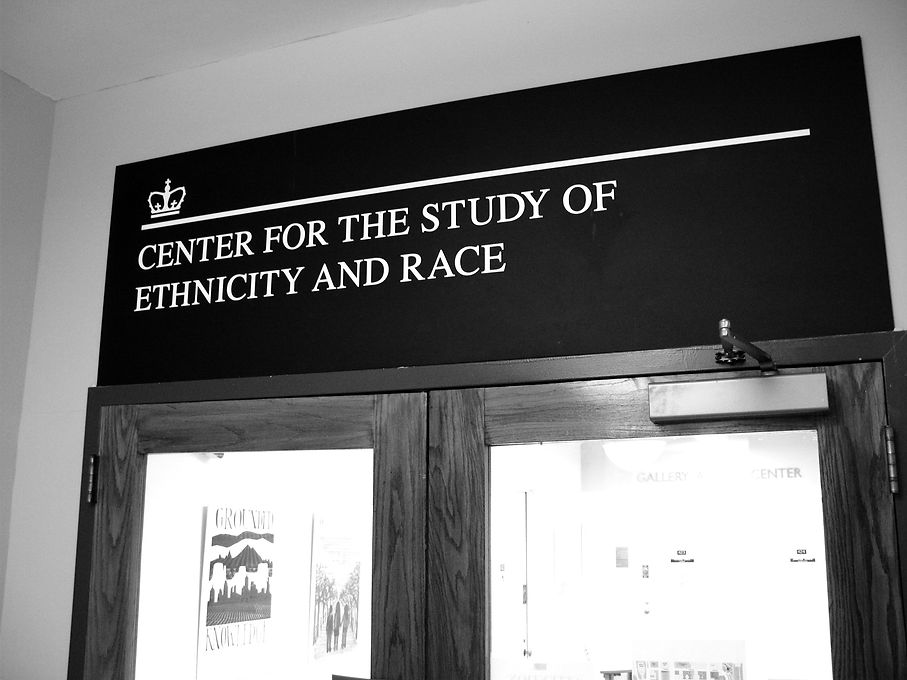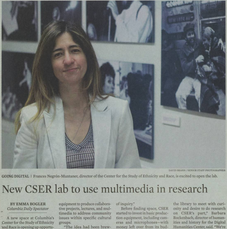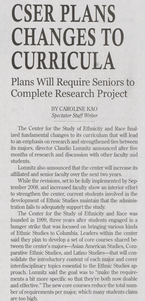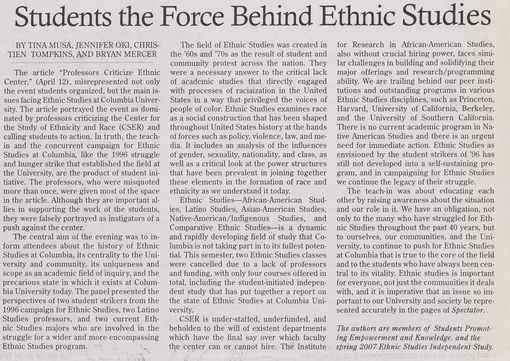

Birth of Columbia's CSER, 1999
The Center for the Study of Ethnicity and Race is established three years following the hunger strike. CSER is housed at 422 Hamilton Hall and will host programs in Latino, Asian American, and African-American Studies. The Center’s mission is defined as: "support[ing] and promot[ing] the most innovative thinking about race, ethnicity, indigeneity and other categories of difference to better understand their role and impact in modern societies." By nature, CSER has been and always will be shaped by its students.

Timeline of the Center (1997-- Present)
How did CSER progress over time after the 1996 Ethnic Studies Protests?
Fall 1997
Latino Studies major created
Fall 1998
Asian American Studies major created.
SpEAK (Students Promoting Empowerment and Knowledge) created to inherit goal of liberating education.
Fall 1999
Center for the Study of Ethnicity and Race (CSER) established. Gary Okihiro appointed director.
2001
CSER proposes a major in comparative ethnic studies to the Committee on Instruction on top of its Asian American and Latino Studies major
Fall 2003
CSER absorbs IRAAS's undergraduate component
2004
Comparative Ethnic Studies major created after COI passes proposal.
2006
Claudio Lomnitz appointed as director of CSER.
Nov. 2007
12 students go on hunger strike in support of increased funding and support for CSER and IRAAS.
Hunger strikers and organizers of 1996 issue a statement of support for the Nov. 2007 strikers.
2009
Frances Negrón-Muntaner appointed director of CSER.
Fall 2013
CSER Media and Idea Lab founded by director Negrón-Muntaner
2016
Neferti Tadiar appointed director of CSER.
The Center for the Study of
Ethnicity and Race
Columbia University defines centers and institutes' role as fulfilling its mission of "advancing knowledge and learning at the highest level." It further defines Centers as "typically organized to conduct research [...] on a highly specific theme or topic."
Nowhere in the definition of the center is the acknowledgment of the breadth of subject matter which the Center for the Study of Ethnicity and Race (CSER) covers.

Center for
Gender and Sexuality Law

Center for
Medieval Japanese Studies

Center for
Parkinson's Disease and Other Movement Disorders

Center for
Study of Ethnicity and Race
In fact, the scope of research assigned to individual Centers are as specific as "Gender and Sexuality Law," "Medieval Japanese Studies," and "Parkinson's Disease and Movement Disorders."
Nor does this definition address the kind of educational programs and curriculums (which falls directly under the role of an Institute or Department) which CSER provides its students.

"The purpose of ethnic studies is not only to increase the base of knowledge but to transform the whole of knowledge."
Evelyn Hu-DeHart, director of the Center for Ethnic Studies at the University of Colorado
Ethnic Studies:
Ten Years Later
Columbia Spectator makes a special dedication to the development of CSER through the years exactly 10 years after the conclusion of the ethnic studies protests of '96. It traces its activist history and growing enrollment of students in the program, as well as bring attention to the consistent lack of senior faculty hires for the center.


2013
The History of Ethnic Studies
Gary Okihiro, Director of CSER
Gary Okihiro writes in a special column the relationship between the discipline of ethnic studies and the long history of Third World Liberation movements. He expands the definition of ethnicity and race into world and societal formations, underscoring CSER's role in "redefin[ing] its intellectual direction."
2018
Margins of a Center: Fight for a Better Home for Ethnic Studies
Gavrielle Jacobovitz
Spectator Journalist Gavrielle Jacobovitz commemorates the origins and history of CSER in the special article "Margins of a Center." It highlights the historical moments of CSER and shows how the center has grown in student enrollment despite the challenges it faces with lacking the autonomy of a department. Discussions are held about the correct way to preserve the interdisciplinary nature of CSER while giving it the support and resources it needs.

.jpg)
2020-2021: Acknowledgement of Ethnic Studies at Columbia?
How Columbia Fails to Acknowledge CSER's role in combatting Racism and White Supremacy Time and Again
The year 2020 and 2021 marks a terrible but important time in the fight for racial minorities in the United States. Not only did the brutal murder of George Floyd stir up on a national scale the long-rooted problem of police brutality and anti-blackness, the Atlanta shooting of Asian female workers in a ever-increasing count of anti-Asian hate crimes spotlighted the inherent injustice and inequalities in our society. At the same time, higher education institutions such as Columbia were put to a test on their missions.
In a 2020 email addressed towards the Columbia community, president of Columbia University Lee C. Bollinger acknowledged Columbia's commitment to combat the issues of racism and violence by citing the many ways the school has worked to ensure its goal towards diversity. The Institute for Research in African-American Studies (IRAAS) as well as the African-American and African Diaspora Studies Department, were cited as "important center of research and scholarship" battling racism. The Center for the Study of Ethnicity and Race was not. This suggests two truths that we may reflect upon in the future as we fight for recognition:
1) Whereas the acknowledgement of IRAAS and the African American Studies Department came at a crucial, necessary time, Columbia fails to see the role of centers like CSER which tackles the whole framework of Western hegemonic academia and mode of thought. Referring to a singular department whenever an imminent racial conflict resurfaces can only be temporary and provincial.
2) Columbia acknowledges the prowess of its own department and research centers' in combating racism. If it truly seeks to further its mission in the light of what is happening, the university should and must provide resources and support to these very research centers, especially those like CSER that provide community engagement, scholarly research, and most importantly, education of its students.
Interview with CSER Director of Undergraduate Studies Deborah Paredez
Sharing Views on the Present Challenges and Future Direction of CSER
Here is a brief summary of Directior Paredez's points:
1. How have you and other faculty engaged with CSER over the years?
"We have faculty appointed in departments out of CSER for a 25%, 50% appointments who are hugely invested in our students and in social justice surrounding ethnicity and race."
2. What do you see as the strength of CSER?
"There has been a real infusion across both the creative arts and the social sciences, allowing the students to explore what they want in a range of directions."
3. What drives the creative, non-traditional ways of education at CSER?
"Embedded in the field of ethnic studies is a real questioning of epistemologies and pedagogy […] that values different modes of knowledge production."
4. What do you feel about the space CSER occupies institutionally?
“So in some ways the particular [institutional] structures […] are inhibitive of the deep sense of engagement that often does exist. The structures don’t reflect the kind of work that often happens in the field. They forbid the fluid, disciplinary porous work that [CSER] has been doing.”
“[CSER] focuses quite a lot in the particular case of [understanding of forces of race and ethnicity] that happens in the United States. And yet, we have the introduction to ethnic studies count as a global core class. … it is just evidence of the ways that people of color in the United States are often and frequently […] rendered outside of the borders of what counts as American.”
5. Relationship with Ethnic Studies with the Core and existing disciplines at Columbia
"At its foundation is a questioning and re-evaluation and a reconfiguration of the systems of thought or the epistemologies that we’ve come to know - NOT what we call an additive model - oh, we’ll just add Toni Morrison and we’re covering it all; we’ll add or César Chávez and it’s okay."
6. What are the challenges that CSER faces currently under its Center status?
“The fact that CSER has 63 majors and concentrators - that is sizable for an institute or department."
“I feel like I don’t get to do enough for our students because in CSER […] so one of the biggest challenges is [living] on the kindness of strangers to rely upon other legitimated departments. Then we have to kind of pair with them and convince them that this would be mutually beneficial for them.”
“While there are many professors on campus who might easily fit as CSER professors, [because it is a lot for a professor to take on to be joint-appointed], they may have chosen - and absolutely understandably - to just be in one department. […] It often means asking a lot of professors of color who do end up doing the work for ethnic studies.”
7. Concerns about the interdisciplinary, non-traditional nature of CSER being compromised by departmentalization
“Becoming an institute [at least] should be considered for CSER because it allows for greater resources and greater hiring power.”
“Every single year, we run into the same issues with hiring. It’s because our majors and growing; we have faculty that are completely overworked.”
“I do feel like something has to shift - [as precedented in] Women and Gender Studies or IRAAS.”
8. What do you want to tell the CSER community?
“The thing that I find so inspiring with CSER as director of undergraduate studies is really seeing the remarkable work that our students do. [Out students] really are looking for a way to take agency and ownership over their education.”

Sung E (Jane) Bai, '96 Ph.D. student
"You cannot start talking about specific curricular issues without a place for that curriculum within the academy."













